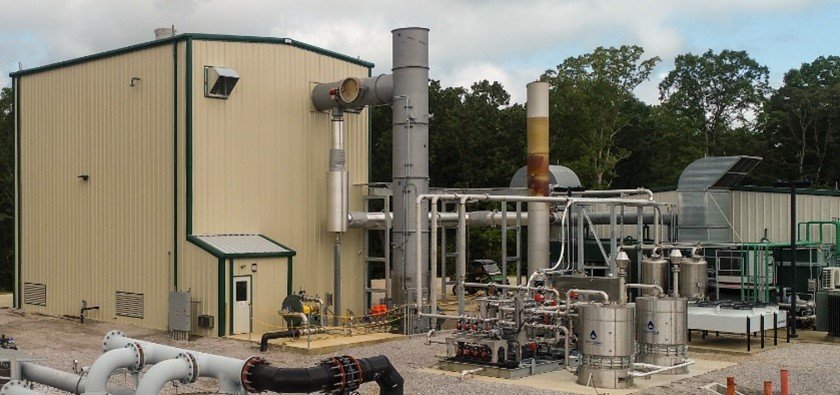Capture Landfill Gas Electricity Waste Heat
If the electricity project continues to operate, capturing waste heat from the landfill gas (LFG) electricity-generation equipment could offer additional revenue or offset onsite heating costs. Waste heat can be captured from the equipment's exhaust or jacket water and used in applications such as providing hot water or thermal heat, generating additional electricity using organic rankine cycle equipment or evaporating leachate.
Criteria:
- Onsite or adjacent demand for heat or steam.
- Waste heat can be captured from existing electricity-generating technology.
- For leachate evaporation – leachate disposal is unavailable or expensive.
Pros:
- Cost savings from offset heating or electric demands can be applied to LFG electricity technology operation and maintenance costs.
- Using waste heat does not decrease the amount of LFG available for the electricity project and increases the project's overall efficiency by recovering more energy content from the LFG.
- Regarding leachate evaporation:
- Can help offset costs from leachate treatment/disposal practices, helping the landfill's overall bottom line.
- Landfill owner has full control of its leachate handling.
- Leachate evaporator equipment can be purchased or leased.
Cons:
- Waste heat may not be sufficiently matched to the heat/electricity demand or quantity of leachate needing treatment.
- Savings from avoided leachate treatment may not be the most cost-effective project alternative.
Economic Considerations:
- Cost savings are site-specific but in the example at right, Three Rivers Regional Landfill reduced leachate disposal costs from about 9.5 cents per gallon to 6 cents per gallon.
More Information:
- LFG Energy Project Development Handbook Chapter 3. Project Technology Options, EPA LMOP
- LMOP Webinar "Don't Waste the Heat!", EPA LMOP
- Combined Heat and Power Partnership, EPA
References
1 U.S. EPA. LMOP Landfill and Landfill Gas Energy Project Database. July 2021. https://www.epa.gov/lmop/lmop-landfill-and-project-database.
2 Heartland Water Technology. Case Studies. Three Rivers Regional Landfill. A Cogeneration Solution for Evaporating Landfill Leachate. https://www.heartlandtech.com/case-studies. Accessed December 17, 2021. Filename “Case+Study+-+3+Rivers_final.pdf”.
3 Weigold, John. MSW Management. A Cogeneration Solution for Evaporating Landfill Leachate. March 2, 2021. https://www.mswmanagement.com/landfills/leachate/article/21209790/a-cogeneration-solution-for-evaporating-landfill-leachate. Accessed December 17, 2021.
4 Cammann, Casey. Heartland Water Technology. Email correspondence. June 14, 2021.

